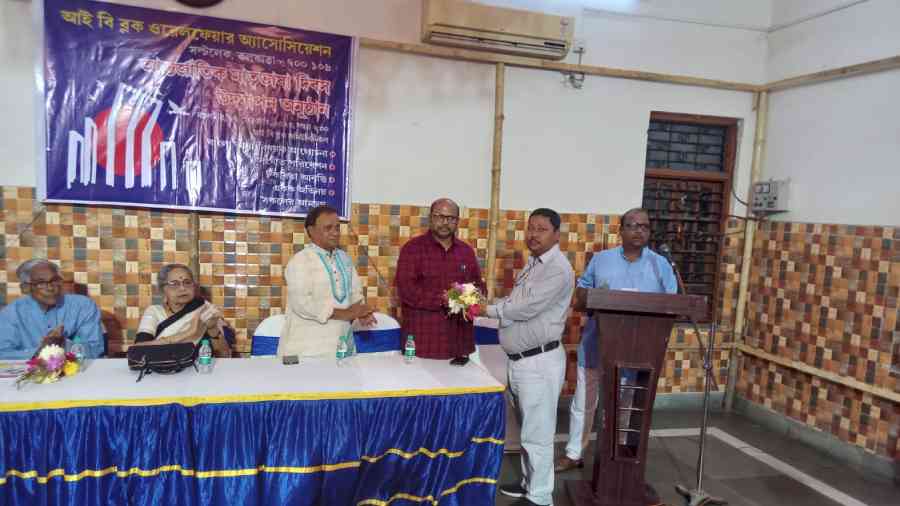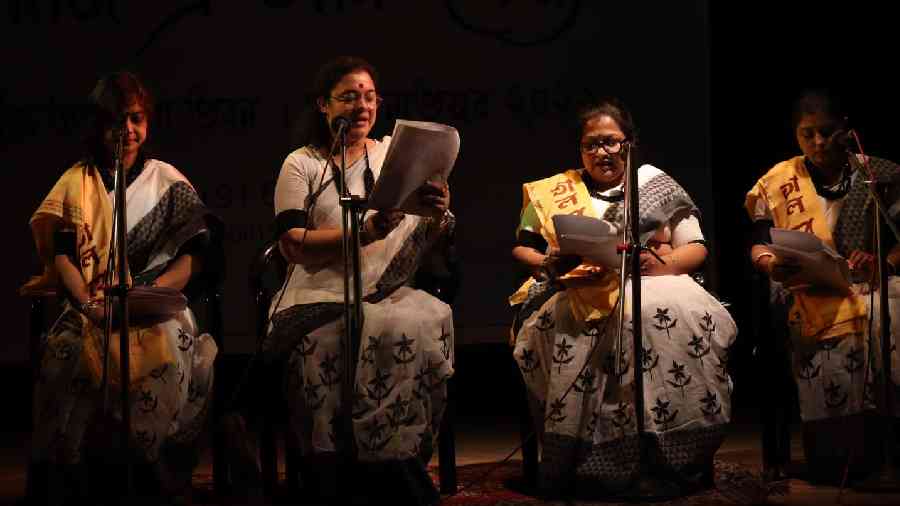Purbachal-based cultural institute Taal Betaal, that imparts training in music, recitation, drama and audio drama, hosted a cultural evening, titled Aaji ey ananda sandhya, at Rabindra Okakura Bhavan recently. The event was divided into three parts — recitation, short play and audio drama.
The programme was dedicated to the memory of poet and essayist Shankha Ghosh and his wife Pratima Ghosh, who were the part of the Taal Betal family.
The event commenced with a prayer song in chorus, Antar mamo bikoshito karo, by students of all ages of the institute. “The poem is a tribute to my teacher Amitabha Bagchi whose legacy I want to take forward,” said Ditipriya Sarkar of Taal Betaal.
The first phase of the event was dedicated entirely to poetry. Recitation by the senior students began with the poem Sudhu kobitar jonyo by Sunil Gangopadhyay.
This was followed by recitation by tots who stood in a row with great zeal and recited works of poets like Ghosh, Gangopadhyay, Nirendranath Chakraborty, Sunirmal Basu and Rabindranath Tagore down to Chandan Nath, Ramachandra Paul and Ratan Tanu Ghati.
Rashmita Kheto, 8, recited Jhar by Moitreyi Devi. “When a storm comes I feel very excited since it will be followed by heavy rain and I can float paper boats in rain water,” said the Class II student, who resides in Dakshineswar.
The teenagers recited comic poems like Ganer Larai, Narad narad, Kartababur Mejaj etc. Ipsita Chowdhury, 13, who recited a Bhabani Prasad Majumdar poem, said while she enjoyed reciting the poem, her first love was theatre other than dance. “I joined Taal Betaal when I was only five or six years old.”
Senior students recited poems based on themes like humanity and religion, struggle for Independance, pangs of Partition etc. This was followed by a comedy, Jutor Doulote, by Ashapurna Devi.
The event concluded with two audio plays Tarubalar Chithi, written by Nabakumar Basu, and Nishithe by Rabindranath Tagore. “Tarubalar Chithi was selected to be dedicated to women who spend a major part of their lives bringing up other people’s children. My son was also brought up by a woman like Tarubala. Her name was Sabita. She passed away in the second wave of Covid. Sabitadi’s granddaughter is being groomed at Taal Betal,” said Sarkar, who had written the scripts of both the stories.
Bharati Kanjilal
Language tribute

Local councillor Ranjan Poddar being welcomed at the programme at IB Block community hall with chief guest Minakshi Sinha seated at the table
The 24th edition of International Mother Language Day (Bhasha Dibas) was observed and commemorated by the IB Block Welfare Association at their community centre.
The chief guest was 81-year-old author, performer and academic Minakshi Sinha, who still teaches Bengali and does stage shows with equal gusto.
Her one-hour presentation was a bouquet of music and recitation. In her address, the JC Block resident pointed out that alongside the Amar Ekushey movement in erstwhile East Pakistan and now Bangladesh, the bloodshed that had taken place in Assam for the recognition of the mothertongue on May 19, 1961 must not be forgotten. Among the 11 people martyred at the Silchar railway station,16-year-old Kamala Bhattacharya was the only woman who dedicated her life to the cause.
She shared how the Bengali language, especially Tagore's compositions in Bengali, was being absorbed by people in different parts of the world. "My friends in Bangladesh say the major weapon in their struggle for the mother tongue and freedom was Tagore songs,” said the lady.
Sinha presented a mixed bag of patriotic songs, recitation and narration commemorating the language martyrs in both Bangladesh and Assam. She ended with an appeal: to take a pledge to pay sincere regards to “our language mother” in this globalised world. She went on to present a short audio play titled Durasha, based on a story from Tagore's Galpoguchchho, which she said she had performed “over a hundred times” on both sides of the Indo-Bangladesh border.
President of the association Subhash Mukhopadhyay welcomed everyone. Councillor Ranjan Poddar commented on the inclination of the present generation to study in the English medium and reminded parents about their role and responsibility in this regard.
Writer and veteran journalist Debabrata Mukhopadhyay, a block resident, said how Bangladesh was the only country in the world where such a struggle had taken place for the recognition of the mother tongue. “This incident and the struggle in India in 1961 in neighbouring Assam have proved that a bond of language is stronger than that of religion. He also pointed out that February when we observe the day of the mother tongue is coincidentally the same month when in 1835 British historian and politician Thomas Babington Macaulay officially introduced English language and British education in India. “There is no conflict between English and Bengali and there is no reason that we should forget our mother tongue to learn English,” he said, citing scholars and writers like Nirad C. Chaudhuri and modern Bengali poets Bishnu De, Jibanananda Das and Samar Sen who were stalwarts in English.
Poems on February 21 were recited by Manjula Duari, Shukla Mallick and Sanjib Biswas. Assistant secretary, sports and culture, Sudipto Mukhopadhyay read out a piece written by a neighbour, Utpal Sengupta, on the incidents that led to the firing on February 21, 1952.
The programme concluded with a discussion on the origin of Bengali names of different places by former director, Geological Survery of India Utpal Chakraborty, who is also a resident of IB Block.
Bharati Kanjilal
